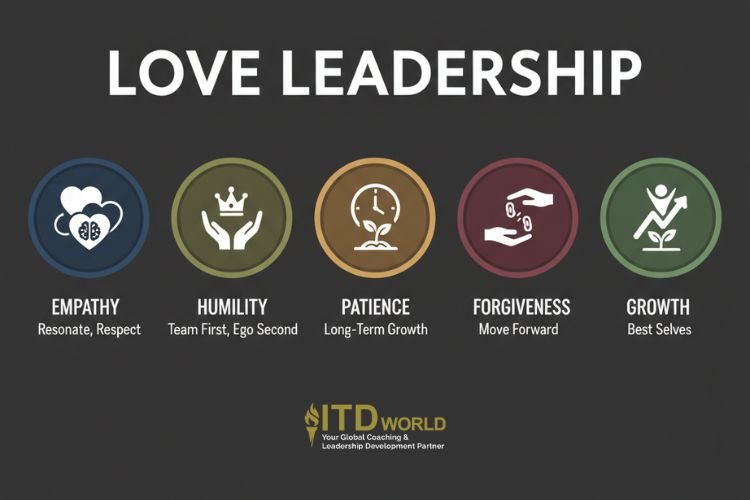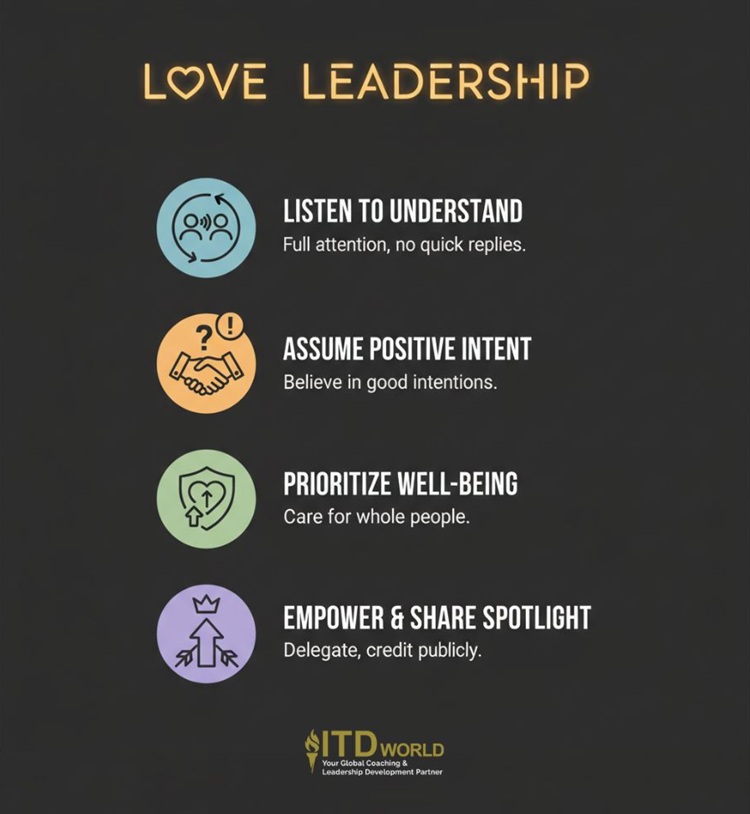Love leadership is a transformative management approach in today’s business world. Learn how to practice it with this guide!
The ability to build teams that are truly committed, not just compliant, is a profound advantage in today’s technologically and data-driven landscape. Such commitment cannot be demanded through authority or fear; it’s cultivated through what we call “love leadership“.
|
Author: Jonathan M. Pham |
Highlights
- Love leadership is a management philosophy that prioritizes the well-being, growth, and success of team members, believing that such a selfless approach fosters sustained organizational success by encouraging individuals to contribute their best work, creativity, and commitment.
- Leading with love, characterized by fostering trust and psychological safety, is not only a humane approach but also a highly profitable business strategy that boosts performance, innovation, and retention.
- Practicing love leadership requires consistent, observable behaviors like active listening, assuming positive intent, prioritizing team well-being, and empowering team members by sharing the spotlight to build trust and psychological safety.
- A crucial aspect of adopting this philosophy is to demonstrate “tough love” – i.e. integrating deep empathy with high accountability, demonstrating a commitment to individual and collective success by addressing underperformance and upholding high standards through supportive yet firm intervention.
- Love leaders are typically perceived wrongly as being “too soft”; additionally, they need to overcome challenges such as personal ego and the prevalence of results-only cultures – which can be resolved by demonstrating their effectiveness through data and gradual efforts over time.
What is Love Leadership?
Originating from the Greek concept of agape – a selfless, unconditional positive regard for others, love leadership is a management philosophy that prioritizes the wellbeing, growth and success of your team members, believing that such a choice provides the most sustainable path to organizational success. More than mere sentimentality or personal affection, it is the conscious practice of seeing your people as whole human beings, not just as resources to be managed for output. A love leader operates from the principle that when people feel genuinely cared for and supported, they will contribute their best work, creativity, and commitment.
Main characteristics:
- Empathy: The foundational ability to genuinely resonate with and share the feelings of another – as well as to consider their perspectives with respect, even during disagreements.
- Humility: The self-awareness to recognize that you do not have all the answers to every problem – accompanied by the willingness to prioritize the team’s ideas and success over your own ego.
- Patience: The wisdom to give people the space to learn, develop, and even make mistakes without immediate reprimand, focusing on long-term development over short-term perfection.
- Forgiveness: The capacity to let go of mistakes once they have been addressed and learned from, which prevents a culture of blame and allows individuals and the team to move forward with confidence.
- Commitment to growth: A deep, personal investment in helping each team member become the best version of themselves, both professionally and personally.

Examples of love leadership in action:
Consider this scenario: a consistently high-performing employee suddenly starts missing deadlines. In such a case, a traditional manager might focus solely on the performance drop, demanding an explanation and threatening consequences. A love leader, however, would approach the situation differently. They would initiate a private, supportive conversation to get to know the root cause. If they discover the employee is dealing with a serious personal issue, they would demonstrate patience and commitment by working with them to temporarily adjust workloads and connect them with company support resources. In other words, they value the person over the immediate task, an act that builds lasting loyalty.

Love-based leadership
Fear vs Love Leadership: The Business Case for Leading with Love
Every leader makes a choice, whether consciously or not, about the emotional culture they create for their team. This decision generally falls on a spectrum between two opposing philosophies: leading with love or leading with fear. While both can produce short-term compliance, their long-term impact on performance, innovation, and talent retention is dramatically different.
| Aspect | Fear-Based Leadership |
Love-Based Leadership
|
| Primary Motivation | Compliance through the threat of punishment or negative consequences. |
Commitment through inspiration, purpose, and genuine trust.
|
| Team Environment | Anxiety, risk-aversion, and high burnout. Mistakes are hidden. |
Psychological safety, creativity, and high engagement. Mistakes are welcomed as learning opportunities.
|
| Communication | Controlled, top-down, and typically lacking in transparency. |
Open, honest, and two-way. Feedback is encouraged.
|
| Long-Term Result | High employee turnover, stagnant innovation, and a culture of self-preservation. |
High retention of top talent, continuous improvement, and a culture of loyalty.
|
Over the years, studies have consistently revealed a fundamental truth: leading with love is not just a more humane choice; it is a more intelligent and profitable business strategy. Fear-based cultures are incredibly expensive; a SHRM report once estimated that toxic workplaces cost U.S. businesses billions due to employee turnover alone. On the other hand, a culture of love – which fosters high levels of trust and psychological safety – acts as a potent performance multiplier.
- The power of psychological safety: The most extensive research on team effectiveness, Google’s Project Aristotle, concluded that psychological safety was by far the most important factor in high-performing teams. Teams where members felt safe to take risks and be vulnerable without fear of punishment were more innovative, hit their goals more effectively, and reported lower rates of turnover.
- The ROI of trust: Love leadership builds trust, which in turn drives results. Research has consistently shown that employees in high-trust organizations are more productive, engaged, and likely to collaborate effectively. For instance, a Deloitte study highlighted that trusting employees are 260% more motivated to work and 50% less likely to look for another job than their peers in low-trust environments.
As Simon Sinek once stated, “Leadership is not about being in charge. It’s about taking care of those in your charge.” This principle of care and service is not just good ethics; it is the foundation of a sound and sustainable business strategy that drives results in the 21st-century workplace.
If I have no love, my speech is no more than a noisy gong or a clanging bell.
Why love is important in leadership
How to Practice Love Leadership: Principles in Action
Love leadership is not an abstract feeling; it is a discipline demonstrated through consistent, observable behaviors. Translating the philosophy into practice requires a conscious commitment to a set of principles that promote trust, foster psychological safety, and show genuine care for your team.
-
Listen to understand, not just to reply
Listening is the most fundamental act of showing respect. It is the discipline of giving someone your full attention, setting aside your own agenda, and seeking to truly grasp their perspective without simultaneously formulating your response or rebuttal.
Example: When a team member brings you a problem, resist the urge to immediately jump in with a solution. Instead, try to ask clarifying, open-ended questions like, “Tell me more about that,” or “What is the biggest challenge for you in this situation?” – so as to ensure that you are solving the right problem and make the person feel heard.
Read more: Mastering Active Listening – Essential Skills for Success
-
Assume positive intent
In other words, it refers to the conscious choice to believe that your team members are acting with good intentions, even when an action leads to a negative result. Doing so shifts the entire dynamic of difficult conversations from blame to collaborative problem-solving.
Example: If a project deadline is missed, instead of starting with a suspicious tone like, “Why didn’t you finish this on time?”, a leader assuming positive intent would ask, “It looks like we missed our target date. Can you walk me through the obstacles you ran into so we can figure this out together?”
-
Prioritize your team’s well-being
As a love leader, your job is to actively demonstrate that you care about your team members as whole people with lives and pressures outside of their roles. It is a powerful way to cultivate loyalty and prove that the organization’s commitment to its people is authentic.
Example: Sometimes, it can be as simple as starting a one-on-one meeting with a genuine, unhurried, “How are you doing?” and taking the time listening to the answer. It also means actively encouraging team members to take their vacation time, protecting their weekends from non-urgent work, and modeling healthy work-life boundaries yourself.
Read more: Leading by Example – Key to Truly Inspiring Action & Trust
-
Empower your team & share the spotlight
This is about building your team’s confidence and sense of ownership. It involves giving them the autonomy to do their best work and ensuring they receive the public credit for their successes.
Example: Empowerment means delegating a project’s outcome, not just its individual tasks. Sharing the spotlight means when that project succeeds, you say in a public forum, “This success was driven by Maria’s excellent work on the data analysis and John’s creative design,” rather than a simple, “My team did a great job.” Specific, public praise is a powerful motivator.
Read more: Gratitude in the Workplace – A Reflection on Its Miraculous Impact

How to become a loving leader
The Nuance of “Tough Love Leadership”: Combining Care with High Expectations
Human relationships must be based on love – but not a blind or spoiling love. A small good is like a great evil. True love requires that we rigorously seek to discern what is indeed best for others.
Kazuo Inamori
A common misconception is that love leadership means avoiding conflict or difficult conversations to spare people’s feelings. In fact, the opposite is true. One of the most unloving things a leader can do is to let a team member underperform, behave in a way that harms the team, or stagnate in their career without intervention.
Love leadership, in its most complete form, includes “tough love.” This is not about being harsh or aggressive; rather, it is the practice of holding people to high standards because you believe in their potential and are deeply committed to their success. It is the synthesis of two critical elements:
- High empathy: Authentically caring for the individual and seeking to know their perspective.
- High accountability: Upholding clear, ambitious standards for performance and behavior for the good of the individual and the team.
When these two are combined, it results in an environment of supportive, compassionate rigor. You show that you care enough about your people to not let them fail.
Now, let us consider a scenario where a talented team member is consistently late in delivering their part of a collaborative project, causing stress for the rest of the team. A traditionally “tough” manager might reprimand the person in front of others or send a terse email, focusing only on the missed deadlines (which breeds fear and resentment). On the other hand, a leader practicing “tough love” would handle it differently:
- Private & empathetic inquiry: They would schedule a private one-on-one meeting and start with an objective observation and a question. “I’ve noticed that your last two project deliverables have been late. That’s not typical for you, and it’s putting pressure on the rest of the team. Can you help me understand what’s going on?”
- Clear expectation + offer of support: After listening, they would reinforce the standard while offering partnership. “It is crucial for the team that we all meet our deadlines. I need you to get back on track with this. What specific support do you need from me to make that happen? Do we need to re-evaluate your workload or find you a resource to help with a specific task?”
This approach holds the individual accountable for their impact on the team while simultaneously showing a commitment to their personal success and well-being. It is the ultimate expression of love leadership – because it balances compassion for the person with an unwavering commitment to the high standards that lead to both individual and collective achievement.
Read more: Spiritual Leadership – A Remedy for Today’s Workplace Woes

Challenges of Love Leadership
Adopting a leadership style that prioritizes empathy and service – especially in environments that have traditionally valued top-down authority – is a courageous act that is not without its challenges. Those who choose this path are likely to face resistance both from their colleagues and from their own long-held habits. Anticipating and preparing for the following hurdles is key to successfully implementing and sustaining a love leadership approach.
- Overcoming the “too soft” label
In some corporate cultures, a focus on compassion and well-being can be misconstrued as being “too soft” or not sufficiently focused on hard results. Other leaders may be skeptical of its effectiveness in a competitive business environment.
Solution: Let your results (i.e. data) do the talking. Don’t argue about the philosophy; demonstrate its impact instead. When you report on your team’s successes, directly connect your leadership approach to the outcomes.
Example: Instead of just reporting higher sales, you might say, “By focusing on improving our team’s psychological safety and individual well-being this quarter, we saw a 15% decrease in voluntary turnover and a 10% increase in our customer satisfaction scores, which contributed to our strong sales performance.” Tying the “soft” practice to hard metrics makes the business case undeniable.
Read more: How to Build a Lasting Leadership Legacy
- Managing your own ego & fear of vulnerability
Many leaders have been conditioned to believe they must always be strong, have all the answers, and never show weakness. The practices of love leadership – admitting mistakes, showing empathy, and being vulnerable – may therefore feel risky and counterintuitive to this established identity.
Solution: Treat it as a personal development journey – a new skill set that requires practice. Start small in safe environments. Practice active listening with a trusted colleague. Admit a small mistake to your team and observe the (usually positive) reaction. Working with an executive coach is also worth considering, as it provides a confidential space to practice these new behaviors and nurture the confidence needed to lead more authentically.
Read more: Leadership Self-reflection – Key to Leading with Clarity
- Leading with love in a “results-only” culture
It is typically difficult to practice a people-first approach when the wider organizational culture seems to value short-term results above all else, creating conflicting pressures on the leader.
Solution: Create a “pocket of excellence.” You may not be able to change the entire company overnight, but you can change the culture of your team. Focus on building a high-trust, high-performance micro-environment. Protect your team from unnecessary external pressures where possible, and champion their well-being fiercely. Over time, the sustainable high performance of your team – marked by low turnover, high engagement, and consistent innovation -will become a powerful and visible case study. Eventually, others will start asking, “What are you doing differently?” and your pocket of excellence will begin to positively influence the broader organization.
Read more: High-performance Culture – A Blueprint for Driving Excellence
Love Leadership Quotes
Check out more leadership quotes here!
Before you are a leader, success is all about growing yourself. When you become a leader, success is all about growing others.
Jack Welch
Leadership is creating a state of mind in others. The difference between being a leader and manager, all due respect to managers, is that leaders have to create states of mind.
Barbara Mikulski
A leader is one who knows the way, goes the way, and shows the way.
It’s an interesting equation: Less me + More them = Success.
Do not follow where the path may lead. Go instead where there is no path and leave a trail.
Ralph Waldo Emerson
People don’t care how much you know until they know how much you care.
Theodore Roosevelt
Respect the Divine and love people. (敬天愛人)
Kazuo Inamori – Kyocera’s management philosophy
Better than a thousand hollow words, is one word that brings peace.
Buddha
Whoever would be first among you must be servant of all.
Matthew 20:26
Love Leadership Books
- Love Leadership: The New Way to Lead in a Fear-Based World by John Hope Bryant: In his book, Bryant champions the idea that love – not fear – is the most powerful force in leadership. He outlines five core principles: Loss Creates Leaders, Fear Fails, Love Makes Money, Vulnerability is Power, and Giving is Getting. It’s a bold call to lead with empathy, especially in uncertain times.
- Power of Love Leadership: 7 Proven Strategies to Drive Success, Maximise Results and Inspire Compassion and Trust by Sarah Higgins: Within her work, Higgins presents a practical framework for leaders who want to build trust and inspire teams through compassion. Her strategies are rooted in emotional intelligence and are designed to contribute to the establishment of high-performing, human-centered workplaces.
- The Art of Love-Based Leadership: Transforming the Way You Lead by Dr. Maria Church: Blending organizational development with heart-centered leadership, Dr. Church’s publication introduces the “Love-Based Leadership Model,” which emphasizes authenticity, connection, and purpose as the foundation for sustainable success.
- Lead from the Heart: Transformational Leadership for the 21st Century by Mark C. Crowley: Crowley argues that traditional leadership models are outdated and that leading with emotional intelligence and care is the key to unlocking people’s potential. His work is backed by research and real-world examples that show how heart-led leadership drives performance.
- Radical Love: From Fear to Freedom by Zachary Levi: While not a leadership manual in the traditional sense, this memoir explores how embracing vulnerability and love can transform personal and professional life. It’s a compelling read for leaders seeking deeper self-awareness and authenticity.

Join the Movement: Discover ITD World’s Love Leadership Solutions
Choosing to lead with love is more than just adopting a new management style; it is about heading toward a more humane, compassionate, and ultimately more effective way of leading. The journey requires courage, commitment, and a dedication to continuous growth.
At ITD World, we believe so strongly in the power of this approach that we launched the Love the World Initiative (LWI), a global movement designed to make a meaningful impact by offering free coaching, leadership development, and personal growth resources to people around the world. At its heart is a mission to empower 100 million leaders through fully sponsored coaching programs, designed to help individuals become more effective and visionary leaders.
The initiative is our commitment in action, and it includes:
- Sunrise Eureka Beach Coaching (SEBC): A standout feature led by ITD World’s CEO, Dr. Peter Chee, where he volunteers his time to personally coach leaders from across continents.
- The Let’s Coach App: A state-of-the-art digital coaching platform developed in partnership with the legendary #1 Executive Coach, Dr. Marshall Goldsmith, making coaching insights accessible to all.
- A wealth of free resources: The LWI provides a rich library of expert insights, live masterclasses with global coaching experts, and the “Let’s Coach Rapid Results Newsletter” to continually sharpen one’s skills.
It’s all about spreading love, wisdom, and leadership – without a price tag!

In addition to our global initiative, ITD World also offers a full suite of professional training solutions for organizations ready to make a deep and lasting investment in their people. Our public workshops and customized in-house programs are designed to cultivate the core skills of love leadership, including empathy, creating psychological safety, and leading with accountability and care.
Ready to lead with love and transform your team? Contact ITD World today to learn more about our solutions and pricing!
Other resources you might be interested in:
- Human Leadership in a Digital World: Strategies for Success
- 9 Key Leadership Skills for the Future of Work
- Women in Leadership: Breaking Down Barriers for a More Equitable Future
- 12 Golden Leadership Principles for Attaining Excellence
- Leadership Excellence: Moving From Manager to Multiplier

